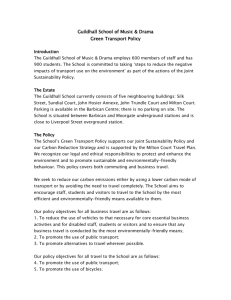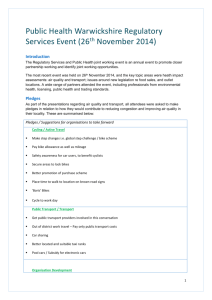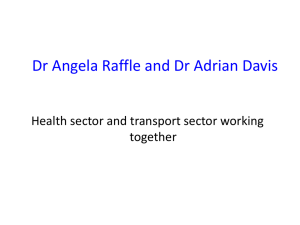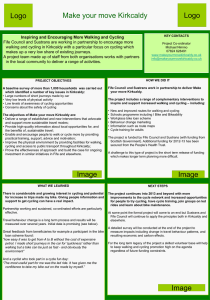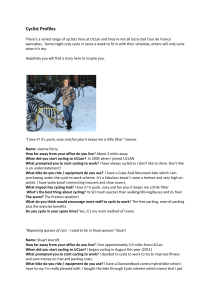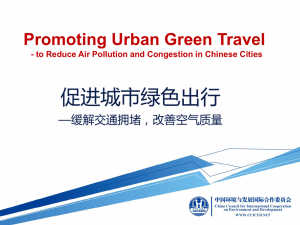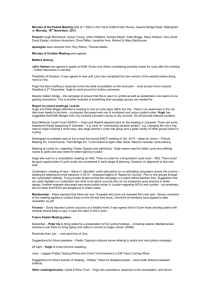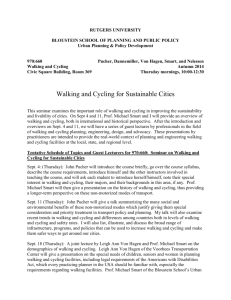Travel Plan Summary - University of Leicester
advertisement
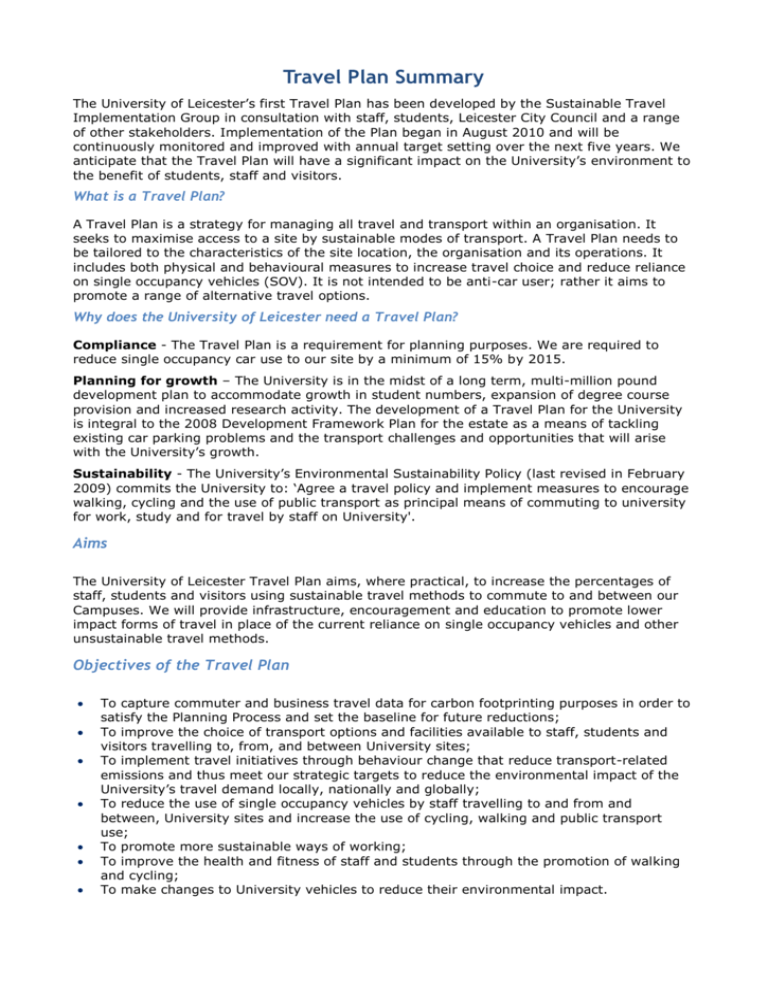
Travel Plan Summary The University of Leicester’s first Travel Plan has been developed by the Sustainable Travel Implementation Group in consultation with staff, students, Leicester City Council and a range of other stakeholders. Implementation of the Plan began in August 2010 and will be continuously monitored and improved with annual target setting over the next five years. We anticipate that the Travel Plan will have a significant impact on the University’s environment to the benefit of students, staff and visitors. What is a Travel Plan? A Travel Plan is a strategy for managing all travel and transport within an organisation. It seeks to maximise access to a site by sustainable modes of transport. A Travel Plan needs to be tailored to the characteristics of the site location, the organisation and its operations. It includes both physical and behavioural measures to increase travel choice and reduce reliance on single occupancy vehicles (SOV). It is not intended to be anti-car user; rather it aims to promote a range of alternative travel options. Why does the University of Leicester need a Travel Plan? Compliance - The Travel Plan is a requirement for planning purposes. We are required to reduce single occupancy car use to our site by a minimum of 15% by 2015. Planning for growth – The University is in the midst of a long term, multi-million pound development plan to accommodate growth in student numbers, expansion of degree course provision and increased research activity. The development of a Travel Plan for the University is integral to the 2008 Development Framework Plan for the estate as a means of tackling existing car parking problems and the transport challenges and opportunities that will arise with the University’s growth. Sustainability - The University’s Environmental Sustainability Policy (last revised in February 2009) commits the University to: ‘Agree a travel policy and implement measures to encourage walking, cycling and the use of public transport as principal means of commuting to university for work, study and for travel by staff on University'. Aims The University of Leicester Travel Plan aims, where practical, to increase the percentages of staff, students and visitors using sustainable travel methods to commute to and between our Campuses. We will provide infrastructure, encouragement and education to promote lower impact forms of travel in place of the current reliance on single occupancy vehicles and other unsustainable travel methods. Objectives of the Travel Plan To capture commuter and business travel data for carbon footprinting purposes in order to satisfy the Planning Process and set the baseline for future reductions; To improve the choice of transport options and facilities available to staff, students and visitors travelling to, from, and between University sites; To implement travel initiatives through behaviour change that reduce transport-related emissions and thus meet our strategic targets to reduce the environmental impact of the University’s travel demand locally, nationally and globally; To reduce the use of single occupancy vehicles by staff travelling to and from and between, University sites and increase the use of cycling, walking and public transport use; To promote more sustainable ways of working; To improve the health and fitness of staff and students through the promotion of walking and cycling; To make changes to University vehicles to reduce their environmental impact. What are the specific targets for the Travel Plan? By the end of 2015, with the proposed initiatives, the University will: Raise awareness of sustainable travel options open to University staff, students and visitors; Reduce the carbon impact of University travel by 35%; Reduce single occupancy vehicle trips amongst staff to 34% (from 49%) and students to 3% (from 9%) (a target set by Leicester City Council); Increase regular bus users; Increase the number of staff cycling and walking to our sites. What are the proposals? From the 2009 survey we found that: 21% 51% 52% 29% 13% of of of of of staff staff staff staff staff indicated that they would be prepared to car share that currently drive are prepared to cycle or walk to work live within five miles of their workplace live within a five minute walk from a direct bus stop to the University are prepared to use public transport to get to work in future We will, therefore, facilitate and promote increased car sharing, public transport use, cycling and walking to University sites as alternatives to single occupancy car use. Travel Plan Initiatives Public transport Available now: Bus discounts for staff - on multi-trip tickets on Arriva and Centrebus Rail discounts - 10% discount on East Midlands Trains season tickets Additional bus services o number 80/81 buses, including the bendy buses to cope with high demand o University logo on buses (Fresher friendly) Coming soon: Park & Ride – we are negotiating to be included on the new route next spring and to obtain discounts for staff and students Rail season ticket loans – to enable staff to pay monthly for an annual season ticket, thus securing the discount Cycling / Walking Available now: o Green travel map o Bikeability map showing colour-coded routes around the University sites Interactive online map showing bike and shower facility locations Cycle to work scheme - Tax-free bike scheme for staff Bike Budi / Walk Budi schemes o Database for staff and students to find someone to share their journey with for safety and company Bicycle Users Group re-launched o Now a vibrant, active online community of cyclists sharing information, advice and discussion Dr Bike Sessions o Once per term – making bikes safer and swifter for staff & students Continuation of cycle coding scheme and discounted D locks for staff and students Coming soon: Podium store (already designed and planning permission achieved) Will provide over 250 covered, lockable storage spaces for staff and students in the heart of the main site Entrance 2 re-design (Mayors Walk) - to be more cycle friendly and reduce pedestrian / car / cycle conflicts Improved shower facilities Additional bike storage at MSB, Hodgkin, Adrian, Percy Gee and North Campus o Car Available now: Contractors’ permit scheme Car share scheme o Lift Budi register to enable staff to find a match o Free car share permits for passengers o Dedicated car share spaces Additional off-campus car parking - 180 spaces provided close to Main Campus Coming soon: Car share spaces on Main Campus Pay & Display car park Increased & improved motorbike parking Flexi-permits New permit scheme (Sept ’11) General Available now: Travel website - Regularly updated with the very latest Travel offers, initiatives and advice Travel Options Booklets Travel Plan partnerships established - First meeting of the area travel plan group taken place Green Fleet audit Car parking permits It will be necessary to reduce the number of permits issued to align more closely with the number of spaces available. The charges for staff parking permits are currently being reviewed and are likely to be based on car emission levels and salary bands. The basic principle of the scheme is that drivers with less polluting vehicles will be able to qualify for medium or low tariffs. The cost of car parking is likely to rise over the life of the plan as more sustainable alternatives come on stream. Permits will be allocated using agreed criteria that are likely to be based on travel distance from home and the availability of alternatives to car travel. Priority will be given to medical conditions, essential car users and those with relevant caring responsibilities. A flexi permit will be introduced to eligible staff who only wish to park on campus up to 110 working days per year, to provide flexibility for infrequent users and part time/temporary staff. A pay and display car park will cater for occasional non-permit holders and visitors. Travel Plan Review Each year we will review and report progress on targets and revise the plan in accordance with University developments and relevant external factors.
